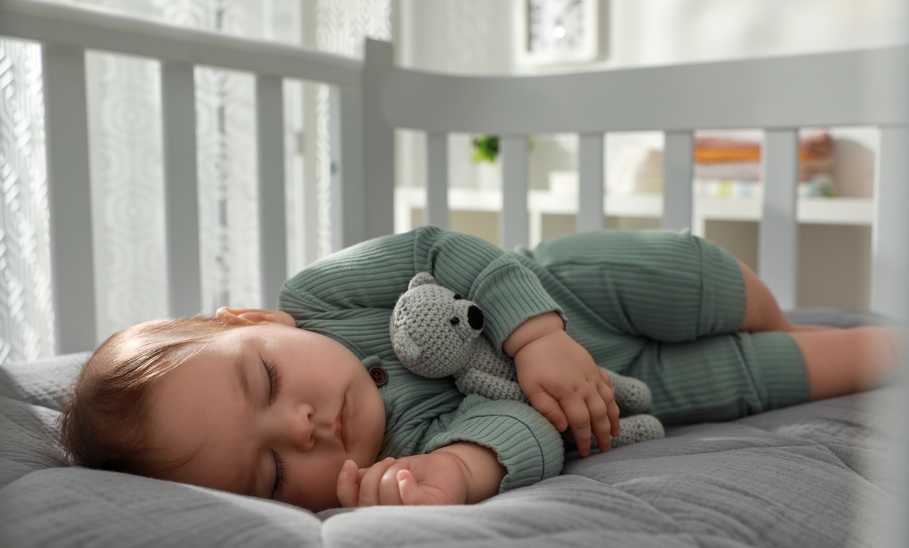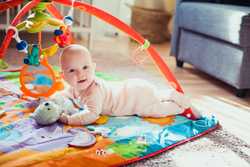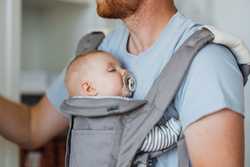When to Move From Bassinet to a Crib for Baby’s Best (and Safest) Sleep Ever

Our evaluations and opinions are not influenced by our advertising relationships, but we may earn a commission from our partners’ links. This content is created by TIME Stamped, under TIME’s direction and produced in accordance with TIME’s editorial guidelines and overseen by TIME’s editorial staff. Learn more about it.
Moving your baby from a bassinet to a crib is a huge milestone. It seems like just yesterday, you brought your little bundle home from the hospital. Remember how snuggly they looked, all swaddled up? Now, your baby is a smiling, wiggling little being who’s quickly outgrowing his or her sleeping situation. And the bassinet they once slept in is getting too small. If the transition from bassinet to crib is in your new future, you likely have many questions and concerns. In this article, you’ll learn about the best timing for the transition and what to expect. Read on for an easy-to-follow guide on your baby’s next big adventure.
The American Academy of Pediatrics (AAP) suggests that parents sleep in the same room as their baby (but not in the same bed) for at least the first six months. A bassinet can be pulled up right next to a bedside, creating a safe sleeping space for your newborn and allowing you to be within arm's reach of your baby. But this blissful sleeping arrangement won’t last long. Once your baby reaches a certain weight and age, it’s time to move to a crib.
Debbie Gerken, RNC-NICU, a certified Pediatric Sleep Coach at Sleep Like a Baby Consulting, says it depends on the bassinet.
“There are specific safety guidelines and height/weight limitations for each bassinet. Parents should refer to the manufacturer’s guidelines for those recommendations,” says Gerken. “Most bassinets have a weight limit of 15 to 20 pounds.”
Age is relative. What really matters is your baby’s weight and what developmental milestones they have hit. If your child can roll over, it’s probably time to move on to a crib.
“[Babies] need to move to a crib when they start pushing up on their hands and knees or rolling over. That developmental milestone usually happens around the 3 to 6-month mark,” says Katie McCann, a breastfeeding counselor and former Health and Care Professions Councils (HCPC) paramedic. “So as a general rule of thumb, parents should plan on transitioning their baby to a crib sometime between 3 to 6 months old.”
Parents know any slight change to a baby’s sleep schedule or setting can cause nighttime (and naptime) chaos. But transitioning your baby from a bassinet to a crib is easier than you think.
Start the transition by putting your baby in the new crib for nap time. “This allows them to get familiar with sleeping in it for shorter durations and work up to sleeping long stretches during the night,” says Gerken.
Giving your baby time to acclimate to the crib during wakeful times is also helpful for building positive associations with that space.
“For instance, place a baby in the crib during the day with the shades open to send the message that this isn’t sleep time. Have the baby play in there as you are in the room folding wash or cleaning up the room,” says Gerken. “Singing songs, playing music, and playing peekaboo-type games can also build their sense of security within their new sleep space.”
Babies seemingly grow overnight. If you wake up one morning to see that your baby is looking cramped, it’s time for a bigger sleeping space.
Bassinets are meant for newborns who do not move around very much. Once your baby is more mobile, a bassinet is no longer safe.
“Once a baby can roll from back to front and front to back, the bassinet is no longer a safe sleep space,” says McCann. “Babies need to be able to move freely to maintain a clear airway, so a flat, spacious crib is a must.”
Even if your baby hasn’t met certain milestones or weight restrictions, moving them to a crib around six months is the safest thing to do. According to the Sleep Foundation, babies undergo sleep regression at this age. This means they wake more frequently and find falling and staying asleep more difficult. A crib provides a safe space for this sleep milestone.
Transitioning from a bassinet to a crib can be challenging. Babies like consistency, and changing their sleeping arrangements changes their sleep routine. Many babies love the cozy, confined space of a bassinet and may resist their new spacious crib surrounds. Some babies may also feel separation anxiety.
“Around the same time that many babies transition to the crib, they also go through a developmental phase where they start to understand object permanence,” says McCann. “Basically, they realize that when you leave the room, you still exist somewhere else. This can make bedtime extra challenging.
Safety should be your number one priority. Whether in a bassinet or a crib, the AAP suggests placing your baby on its back while sleeping. Your baby should sleep alone on a firm surface like a crib mattress without blankets or other soft items like pillows or stuffed animals.
Transitioning from a bassinet to a crib takes time. It won’t happen overnight, so be patient with yourself and the baby.
This is a big step in your baby’s life, and you may be realizing just how fast time flies. It’s okay to be emotional — in fact, it’s completely normal. Lean on your partner or friends for support.
The information presented here is created by TIME Stamped and overseen by TIME editorial staff. To learn more, see our About Us page.



